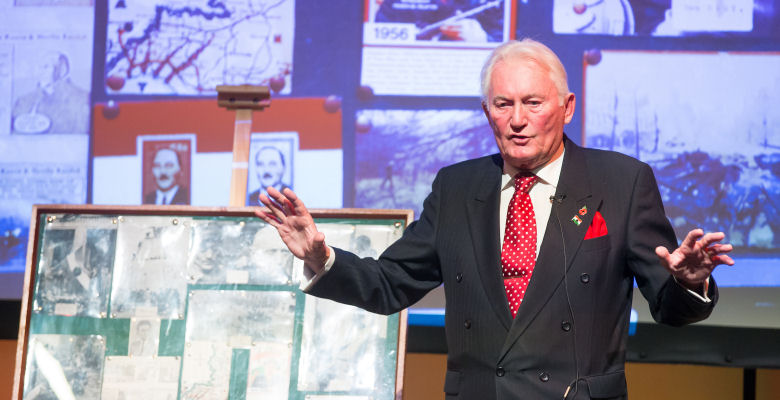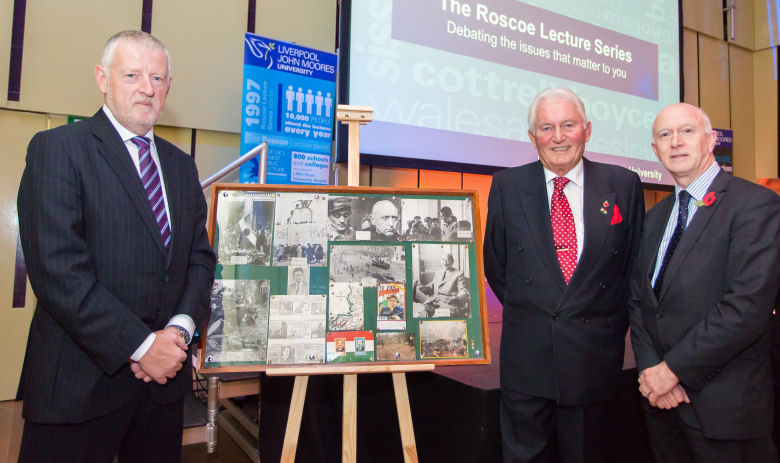Celebrating a remarkable journey
The 142nd Roscoe Lecture was delivered by Honorary Hungarian Consul for the North of England and Scotland, Dr Andrew Zsigmond.

‘Help. Help. Help.’ These words echoing from the dark days of 1956 in a short but impassioned radio broadcast poignantly captured the sense of hopelessness and despair felt by Hungarians as Russian troops crushed their short-lived revolution. So it is perhaps surprising that a Roscoe Lecture reflecting on the Revolution and its aftermath was anything but despairing, instead being a celebration of the indefatigable human spirit.
The lecture was delivered by Honorary Hungarian Consul Dr Andrew Zsigmond, who was a third year medical student in Hungary when the popular uprising started on 23 October 1956. Just a year later he would be living in a new country, speaking a new language and studying medicine at the University of Liverpool. So just how did this extraordinary journey come about?
Like many of his compatriots, Dr Zsigmond joined the fight against communist rule, and during his lecture, he reflected on the initial euphoria of the revolution, outlining their naive but idealistic demands, which included immediate Russian withdrawal. He also described how a lowly penknife helped create the symbol of the revolution – the Hungarian flag with a hole were the communist coat of arms had once been.
During the revolution, Dr Zsigmond would take direct action, authoring an anti-communist newsletter and helping to arrest leading communist figures, such as the secret police chief, who chillingly warned him that he ‘was making a dreadful mistake’ as he was carted off to prison.
His words would indeed prove correct as after its initial successes, the Revolution was soon crushed by Russia, with around 2,500 Hungarians and 2,500 Russian troops being killed; a horrendous aftermath described by Dr Zsigmond as a story of both bravery and tragedy.
Dr Zsigmond was forced into hiding – in his father’s vineyard – but after six weeks, he was forced to escape along with four friends on 4 January 1957. The group consisted of four students - two medics, one architect and a philosopher – and a former actor and matinee star aged in his 60s. Together they escaped to Austria, after hiding in farmyards, negotiating a minefield and narrowly missing being caught up in a gun battle at the border crossing, which saw 10 other Hungarian dissidents being killed.
Dr Zsigmond recollected that the first Austrian they met was a drunk forester, and he recalled how he celebrated his new found freedom by shouting at the Russian border guards, who fired their machine guns impotently in response.
Austria was full of journalists covering the revolution and charging 25 schillings an interview, Dr Zsigmond soon felt rich as well as free. After registering as refugees, the group entered a refugee camp, along with thousands of other displaced Hungarians. On their third day in the camp, an unexpected vehicle arrived, a red double-decker London bus bearing a sign saying ‘Come and be a coal miner in England’. The bus had been turned into a recruiting station for the National Coal Board, and Dr Zsigmond and his fellow medical student saw an opportunity to escape and a few days later they arrived in Barnsley, with jobs as apprentice miners.
There he would meet his local MP, who went so far as to ask a question to the then Prime Minister Harold MacMillan about what he was going to do to help two Hungarian medical students who were working as miners. This precipitated a flurry of university applications – most of which were rejected – with the University of Liverpool eventually offering him a place to continue his studies.
Liverpool has been his home ever since but Dr Zsigmond had maintained his links with Hungary, even helping to build a church back in his home village. He first returned to his homeland in 1966 after receiving a call from another ‘adopted Scouser’ and anti-communist, Bill Shankly, who asked him to act as interpreter when Liverpool Football Club travelled to Hungary to play an international fixture.
During his Roscoe Lecture, Dr Zsigmond demonstrated his laudable approach to life – where challenges are to be overcome, no matter how dangerous, and opportunities embraced, however serendipitous they might be. In the 60th anniversary year of the Hungarian Revolution, this spirit of optimism and resourcefulness is to be celebrated.

Above: Professor Sir Jon Murphy, Chair of the Roscoe Lectures, Dr Andrew Zsigmond and Professor Nigel Weatherill, LJMU Vice-Chancellor.

